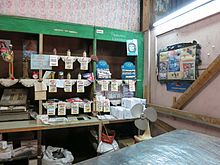This article has multiple issues. Please help improve it or discuss these issues on the talk page. (Learn how and when to remove these messages)
|

Rationing in Cuba is organized by the government and implemented by means of a Libreta de Abastecimiento ("Supplies booklet") assigned to every individual. The system establishes the amounts of subsidized rations each person is allowed to receive through the system, and the frequency at which supplies can be obtained.[1] While the food rations are not free, the ration fees are a small fraction of the actual price of the goods (on average, less than $2 USD for a month of rations, which is approximately 12% of their market value).[1] Purchases of the goods can also be made outside of the system.[1]
Despite past rumors of ending, the system still exists.[2] As of 2012, a coupon book taken to a ration shop provided family minimums for rice, sugar, matches, and oil, above the average wage of $30/month.[3] While most Cubans do not have to pay for rent, healthcare, or education, ration fees often take up a large percentage of their monthly income, and the unsubsidized costs of their monthly rations would be greater than the average monthly income.[1] The amount of food provided to each citizen has decreased somewhat over time due to the end of billions in yearly financial support from the USSR, a drastic reduction of tens of thousands of subsidized petroleum barrels from Venezuela,[4] and according to government officials, increased sanctions from the United States, and there have been significant increases in the ration fees at times.[1] Economic mismanagement has also played a large role in food shortages and rationing, even while the USSR subsidized the island to the tune of $5 billion per year, certain food items still had to be rationed.[5]
All citizens are still provided with subsidized rations today, even those who could otherwise afford to purchase food.[1] President Raúl Castro said in 2011 that the subsidies are far too costly for the Cuban government, involving more than $1 billion USD in food subsidies every year, and that he would like to eliminate the system and its "unbearable burden for the economy" which he claimed produces "a disincentive to work".[1] These remarks were received very negatively among Cubans, and Castro eventually reversed his proposal.
More strenuous rationing on food and other basics was imposed in May 2019 due to the country's economic problems, which resulted largely from a stiffening U.S. embargo, the loss of aid from Venezuela, and difficulties with the state-run oil company.[6]
- ^ a b c d e f g "Cuba Rations Staple Foods and Soap in Face of Economic Crisis". The New York Times. 11 May 2019.
- ^ Tamayo, Juan (July 11, 2013). "Cuba's food ration stores mark 50th anniversary". Miami Herald. Retrieved August 17, 2016.
- ^ "Monika, She is Cuba". May 14, 2014. Retrieved August 17, 2016.
- ^ Fonseca, Brian (January 2020). "Venezuela and Cuba: The Ties that Bind" (PDF). www.wilsoncenter.org.
- ^ Niño, José (2019-06-12). "Cuba Implements Food Rationing as Its Economy Enters Crisis Mode | José Niño". fee.org. Retrieved 2022-09-18.
- ^ "Cuba rations chicken, eggs and rice as economic crisis worsens". National Post. May 10, 2019. Retrieved May 12, 2019.
Cuba imports roughly two-thirds of its food at an annual cost of more than $2.7 billion and brief shortages of individual products have been common for years. In recent months, a growing number of products have started to go missing for days or weeks at a time, and long lines have sprung up within minutes of the appearance of scarce products like chicken or flour.